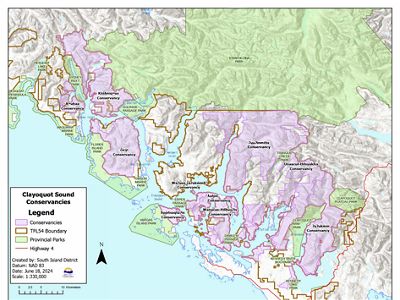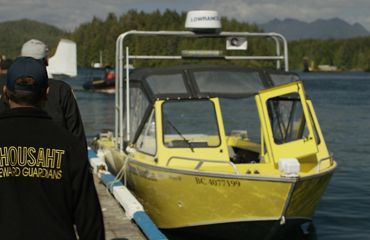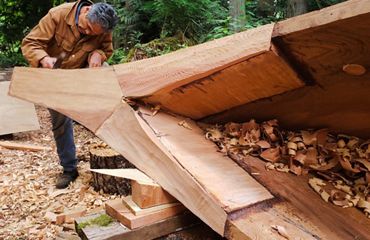
In Clayoquot Sound, First Nations’ Visions and B.C. Tenure Change Advances Old-growth Protection and a Conservation Economy
First Nations leadership has led to 76,000 hectares of new protected areas supported by $40 million raised by Nature United
Media Contacts
-
Jacqueline Nunes
Phone: +1 437-291-3287
Email: jacqueline.nunes@natureunited.ca
The Ahousaht and Tla-o-qui-aht First Nations have worked together with the Government of British Columbia to protect about 76,000 hectares (188,000 acres) in Clayoquot Sound. Previously licensed for commercial forestry, these new conservancies will safeguard some of the last remaining old-growth forests on Vancouver Island and directly reflect the Nations’ land-use visions while advancing Ahousaht and Tla-o-qui-aht rights and sustainable livelihoods.
These new conservancies include old-growth forests on Meares Island, the site of the historic “War in the Woods” protests against logging that galvanized global attention in 1993. Pacific coastal rainforests, such as those in Clayoquot Sound, also hold vast amounts of carbon stored for hundreds of years, making them powerful Natural Climate Solutions that will continue to sequester carbon while contributing to healthy air and water, ecosystem resilience, and the well-being of communities.

Nature United has committed more than $40 million to support the Nations’ visions in Clayoquot Sound, including compensation for the forestry-tenure holder and two endowment funds that will support the Ahousaht and Tla-o-qui-aht Nations in managing the new conservancies and catalyzing the transition to a conservation economy.
“This agreement reflects a commitment that Nature United made to these First Nations over a decade ago,” says Hadley Archer, Executive Director of Nature United. “As an organization, we believe that the increased authority and capacity of Indigenous Nations and communities to steward their lands and waters is critical for the future of healthy ecosystems, communities and economies.”
“We are proud that Nature United's long-term investment in Clayoquot Sound has supported a new model of collaboration and transformative change that will protect globally significant old-growth forests, provide financing for Indigenous-led stewardship, and reverberate in the province and across Canada, as other Indigenous Nations pursue self-determination and sustainable economic development, for the benefit of all citizens.”
Quote: Hasheukumiss

This provides the foundation for future generations to continue renegotiating and asserting authority for how to further protect our territories. It is an important step of many.
Quote: Saya Masso
Establishing these conservancies is a significant milestone for the Tla-o-qui-aht Nation, affirming stewardship authority of our lands that our Hawiih have enacted for untold generations.

“The announcement reflects a path forward to implementing the Ahousaht Nation’s title and rights on our lands and waters for generations to come. At the same time, more needs to be done to acknowledge the Declaration on the Rights of Indigenous Peoples Act in B.C.,” says Hasheukumiss, Hereditary Chief of the Ahousaht First Nation. “This provides the foundation for future generations to continue renegotiating and asserting authority for how to further protect our territories. It is an important step of many.”
“Establishing these conservancies is a significant milestone for the Tla-o-qui-aht Nation, affirming stewardship authority of our lands that our Hawiih have enacted for untold generations,” says Saya Masso, Natural Resources Manager, Tla-o-qui-aht Nation. “We’re grateful for the support from organizations and institutions working in right relations to ensure we have the resources needed to care for the land according to our vision.”
B.C.’s coastal and interior forests are vital to community well-being, livelihoods and cultural values. In places where a transition away from logging is an ecological imperative—particularly given the urgency of the climate and biodiversity crises—governments, industries, communities and environmental organizations can work together to safeguard communities and economies that depend on forestry.
“I support the creation of these conservancies. Collaborative work with First Nations is a cornerstone of our vision for old growth in this province. At the same time, the clarity that these conservancies will bring to the area will give our industry partners confidence in the future of forestry. Conserving nature and creating sustainable jobs are important objectives that we can do to secure a stronger future for everyone,” says Bruce Ralston, B.C.’s Minister of Forests.

Quote: Michael Reid
Conservation financing is an important part of this transformation—with access to diversified funding options, First Nations can focus on fulfilling their visions of stewarding their lands and waters and supporting their communities for many generations to come.
Nature United will capitalize two endowment funds that support the Ahousaht and Tla-o-qui-aht Nations in stewarding the new protected areas in Clayoquot Sound. This permanent financing will be used by the Nations to expand Guardian programs, resource-management planning, ecological restoration, and more. A portion of the funds will support Indigenous-led sustainable economic development, such as ecotourism.
“Conservation in British Columbia is transforming as a result of Indigenous leadership and stronger collaboration across communities, governments, industry, philanthropic partners and conservation organizations,” says Michael Reid, Nature United’s B.C. Program Director. “Conservation financing is also an important part of this transformation—with access to diversified funding options, First Nations can focus on fulfilling their visions of stewarding their lands and waters and supporting their communities for many generations to come.”
The Power of the Emerald Edge
Clayoquot Sound is part of a coastal rainforest spanning more than 40 million hectares.
Learn MoreFor over a decade, Nature United has provided strategic, technical and financial support to First Nations in Clayoquot Sound to support the development of their land-use visions, as well as other initiatives identified by the Nations as important to their cultures, livelihoods and sustainable economic development.
This agreement reflects the continued commitment of the governments of B.C. and Canada, as well as the persistence and hard work of local, provincial and national conservation organizations.
Nature United recognizes the many organizations that have provided critical funding and advisory support to help reach this milestone, including the B.C. Parks Foundation in conjunction with the Wilson 5 Foundation, Bezos Earth Fund, Government of British Columbia, Houssian Foundation, McCall MacBain Foundation, Nature Conservancy of Canada, North Family Foundation, Sitka Foundation and Wyss Foundation.
Nature United remains steadfast in its commitment to support First Nations in Clayoquot Sound as they take the lead in safeguarding one of the planet’s last coastal temperate rainforests for the benefit of future generations.
Click here to learn more about our work and collaboration in Clayoquot Sound over the past decade, including a full list of donors.
Nature United was founded as a Canadian charity in 2014, building on decades of conservation in Canada. Headquartered in Toronto, our organization has field staff located across the country. Nature United supports Indigenous leadership, sustainable economic development and science and large-scale conservation, primarily in British Columbia, the Northwest Territories and Manitoba. Our organization is also working to accelerate Natural Climate Solutions at national and regional scales. To learn more, visit natureunited.ca or follow us on Linkedin, Instagram and Facebook.
We are the Canadian affiliate of The Nature Conservancy, a global conservation organization with more than a million members and a diverse team that includes more than 400 scientists. Our global organization works in more than 80 countries and territories — either directly or through partnerships — to conserve the lands and waters on which all life depends. To learn more, visit www.nature.org or follow @nature_press.